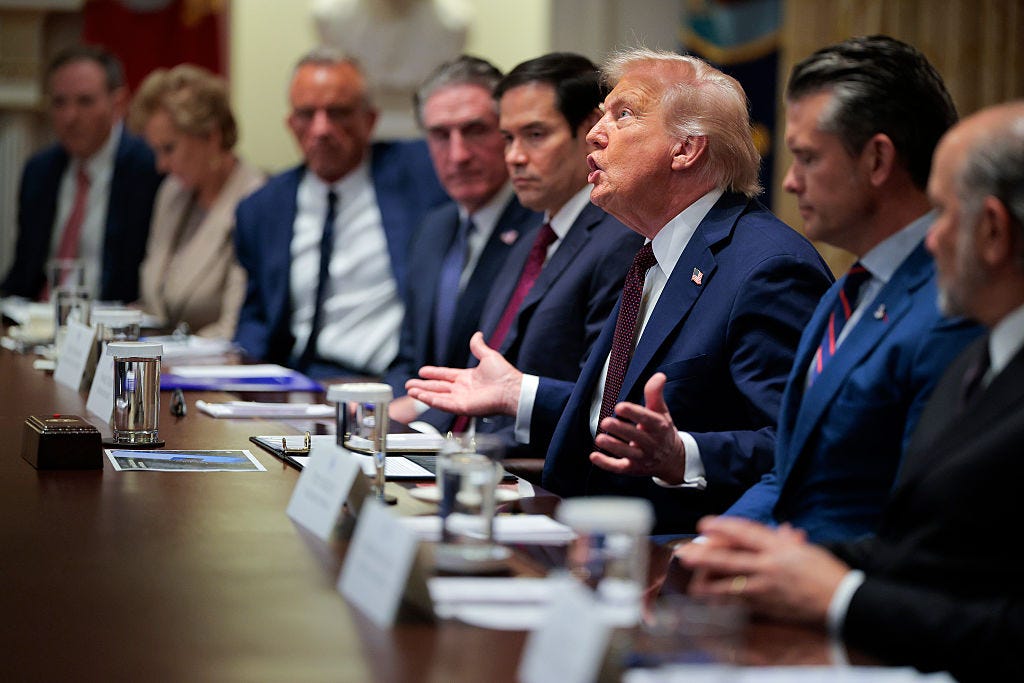America Is Choosing Decline
When the president wants to slit the nation’s throat, the least we can do is not hand him the blade.
The late Charles Krauthammer played a small part in provoking my exodus from the political right a little more than two decades ago.
He was one of a couple dozen neoconservative pundits who went all-in on providing a full-spectrum endorsement of the invasion of Iraq. By “full-spectrum” I mean that he and others presented the decision to topple the government of Saddam Hussein as self-evidently correct on every level: It was the right decision for America’s interests, for the interests of our allies, for the interests of the Iraqi people, for the interests of all civilized human beings on the planet, for the interests of democracy as a form of government, and it was also the right thing to do in purely moral terms. All good things went together, with beautiful wrapping paper and an elegant bow on top.
My study of political philosophy and history taught me something different—that all good things almost never go together, that trade-offs are nearly always necessary. And so I decided to part ways with those analysts who denied this base-level insight into the human condition.
But that didn’t stop me from continuing to read them, if only to confirm I’d made the right decision.
It was in that spirit that I read one of Krauthammer’s first extended statements after the end of the Bush administration. Its title fully conveyed his argument: “Decline is a Choice.” In Krauthammer’s view, the newly-elected president, Barack Obama, was uncomfortable exercising power, was suspicious of American motives, and preferred to let other countries take the lead. But this was an act of irresponsibility that would issue in a diminishment of American power rather than its preservation or enhancement. We would become weaker, initiating our own decline as a global hegemon, and we needed to understand that this would be a function of our own decisions. We were choosing decline when we could, and should, choose the opposite.
It was a powerful argument cogently made, though I recall thinking it was quite unfair to Obama, whose awareness of the tragic ironies at play in America’s actions on the world stage was far closer to my own outlook on the world than Krauthammer’s. And anyway, wasn’t the previous president’s decision to topple a foreign government on the basis of faulty intelligence and without a plan to secure the post-invasion peace also a choice that contributed in real ways to the decline of America’s stature in the world?
But despite my deep disagreements with Krauthammer, I’ve never forgotten the essay and its argument—not through the remainder of the Obama administration; not through the first Trump administration, when the Republican president went much further than Obama ever did in antagonizing allies and shirking our obligations around the world; not through the Biden administration, when the president reversed course to reassert American leadership in Europe, the Middle East, and East Asia; and certainly not today, when the second Trump administration appears more eager than ever before to hasten America’s decline.
Slitting Our Own Throats
I realize this isn’t how most of MAGA thinks about what the president is doing. They think he alone among politicians has his eyes firmly fixed on the reverse—Making America Great Again. But this only demonstrates their obliviousness.
Has a major world power ever intentionally inflicted so much damage on itself in such a constricted period of time? I’m sometimes inclined to reach for a vivid and bloody metaphor to describe it: The world is watching us, stunned, while we slit our own throat—with our initiation of trade wars with countries around the globe (including with some of our closest allies); with our president’s display of pathetically gullible obsequiousness to Russian dictator Vladimir Putin; with firing the head of the Centers for Disease Control and Prevention for refusing to go along with the anti-vaccination ignorance of the Secretary of Health and Human Services; with attempting to fire a member of the Federal Reserve’s Board of Governors, thereby undermining the political independence and trustworthiness of the nation’s central bank; with the president militarizing the nation’s capital and threatening to deploy troops to other cities around the country. I could go on and on.
We should be clear that the United States has an awfully long way to fall. We’re still extremely wealthy by global standards. We have an enormous economy, huge technological advantages, and a massive military. When you’re this big and powerful, and flying this high above the ground, the descent is going to take a good, long while, even with a president doing this much to crash the plane.
What we have come to call “the fall of Rome” happened so slowly and over such a long period of time (several centuries) that it wasn’t until well into what later came to be called the “medieval period” that people began to think, huh, I guess something changed about the Roman Empire. It’s true that sometimes things unfold much faster—the Berlin Wall falls and Eastern Europe escapes from communist control, and then the Soviet Union itself collapses, all in the space of a little more than two years. The Austro-Hungarian and Ottoman Empires shattered quite quickly as well.
But no one is seriously talking about that kind of collapse—the American experiment in self-government culminating in the shattering of the fifty-state union. Instead, they mean that the United States is headed on a trajectory in which we hang together while slowly becoming poorer, weaker, sicker, and more badly governed over time. The fall is going to take a while. It’s a long way down from here. Decades from now, the United States may still be one of the most powerful and richest countries in the world. But we will likely be much less powerful and rich than we are now, with nowhere to go but further down.
Learning to Stop Sharpening the Blade
Why do I think this is likely to be our fate? Because, as the Bulwark’s Jonathan Last notes, enough Americans appear to approve of the haplessly moronic governance of the Trump administration that it’s hard to imagine us fundamentally changing course from our current path. We got a taste of Trumpian stupidity from 2017 to 2021, we tried reversing course to the pre-Trump era for the next four years, and then we decided, You know, we prefer it the other way. Might the electorate, in its infinite wisdom, reverse course yet again in 2028, giving the Democrats another try? Sure, why not! But we shouldn’t kid ourselves into thinking that will resolve anything. Because the voters will eventually sour on that alternative, too, and then maybe they’ll vote next for Tucker Carlson or Curtis Yarvin or Bronze Age Pervert.
I don’t want to leave you with the impression that I’m directing all of my ire toward the MAGA right alone, because that isn’t my intent. Nothing takes place in a vacuum.
I’m haunted by a line the author David Frum injected into the discourse back in 2019: “If liberals won’t enforce borders, fascists will.” The observation applies equally well to a range of problems that progressives find too distasteful or morally suspect to address with confidence and resolve.
This is personal for me now. My family moved this past summer from the Philadelphia suburbs into the center of the city. We love it in all kinds of ways and have no regrets—but this is despite the obvious problems that American urbanites are used to tolerating when they really shouldn’t. I’m talking about crime, but even more so about the related issue of homelessness. It’s a big problem in Philly, and definitely worse than it used to be.
It is very bad that residents of the greatest American cities treat it as normal and a matter of morally motivated indifference that aggressive, usually mentally ill, often threatening homeless people regularly accost pedestrians on streets day and night. They also sleep on stoops right outside of the front doors of private homes and defecate on sidewalks. The general feeling among most of my (invariably liberal) fellow Philadelphians is, This is the unfortunate reality of life in the big city. It would be mean to do anything about it because it would have to involve some form of coercion, and that’s unacceptable.
I’m sorry, but if this is your response, you are part of the problem. To adapt Frum’s line: If you (we) won’t address this situation, Donald Trump and the national guard are going to do it for you (us), and you better believe their approach will be a lot more coercive than one initiated by a Democrat.
For far too long, liberals have flinched from using state power to preserve, protect, and defend the common good that is (or should be) instantiated in our urban public spaces. This isn’t why Donald Trump exists. But it is part of why he’s enjoyed enough support to win the presidency twice and increase his showing over time rather than remaining what he should be, which is a novelty candidate who appeals exclusively to the most rabid faction of the Republican electorate.
So, it’s less that America is slitting its own throat than that it’s dying by a thousand cuts. The last thing Donald Trump’s political opponents should be doing is sharpening the blade.
Damon Linker writes the Substack newsletter “Notes from the Middleground.” He is a senior lecturer in the Department of Political Science at the University of Pennsylvania and a senior fellow in the Open Society Project at the Niskanen Center.
A version of this piece originally appeared in Notes from the Middleground.
Follow Persuasion on X, LinkedIn, and YouTube to keep up with our latest articles, podcasts, and events, as well as updates from excellent writers across our network.
And, to receive pieces like this in your inbox and support our work, subscribe below:






Well, it isn’t just here. What Damon speaks of is global discontent. Britain, under Keir, teeters under civil threat. France engages in political gymnastics and dodgy lawfare to keep LePen at bay. Georgia Meloni is, largely, She Trump. Canada just quit Trudeau and a Trump look-alike probably would have replaced him if not for 51st State blather.
So, Damon - is this Trump too? Is the winter of discontent in the democratic west truly a Trump led disaster…or…has our world order run its course and the left-behinds gotten sick of being under-employed, fentanyl addicted, and mocked as racist deplorables?
You never write of this. You never point out that the entire western culture is in deep sickness and Trump is more response than cause.
Why not?
Is it just easier and more fulfilling to write of American Decline as if these organic things weren’t happening? Why do you continue to defend a failing model that half the western world (not just America) is voting out of power?
Up your game please. You are a public intellectual who is fair, thoughtful, and a great writer. But you miss the forest for the Trump trees.
Sorry, but this piece is crap. It is absolutely void of any critical thinking and contrasting considerations. If this is the quality of content we to expect from a newsletter called "Persuasion" then I suggest it change its name to "Gaslighting" or "Propaganda".
Hey, if you don't want to do the work to list all the corruption, malice, power abusing, dark money... and just about every other national health indicator that was crashing under Biden and Democrat control... just note the state of the US under all Democrat control during the pandemic.
It fine to point out the disagreement with the Trump agenda, but to do so without the acknowledgement that this is what the electorate voted for... to fix already existing problems that Democrats either caused or failed to address... well just say it is not persuasive at all.